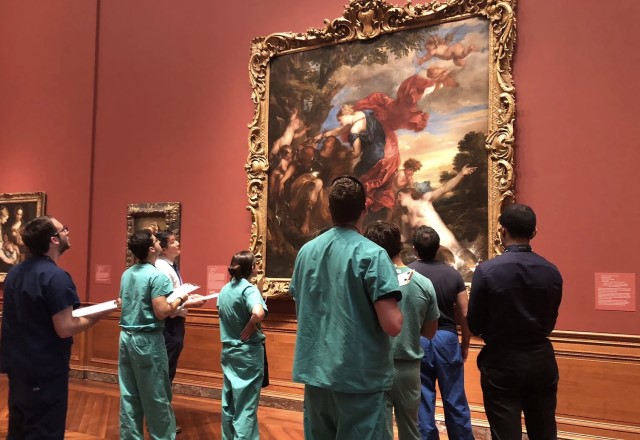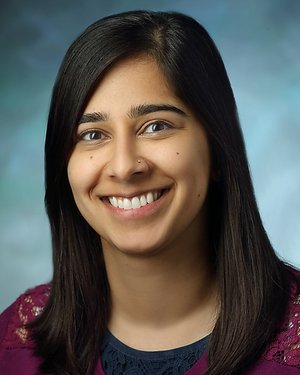Health Humanities Fellowship

The Health Humanities are a transdisiciplinary field that blends arts and humanities with a commitment to social justice. This fellowship is designed to provide Emergency Medicine physicians with an in-depth understanding of the core foundational principles of the Health Humanities as applied to clinical care, health professions education, and scholarship, with an emphasis on how the Health Humanities may pertain to health equity and social justice. This fellowship, the first of its kind, is especially timely and relevant - the arts and humanities have been recognized as tools of pedagogy, advocacy, expression, and critique necessary to advancing health equity, and have been deemed crucial to health professions training by national healthcare organizations. The fellowship leverages the rich resources and networks across the Johns Hopkins graduate and undergraduate campuses.
Goal
Our Through didactics, experiential learning, and mentorship within the frameworks, resources, and leadership of the Johns Hopkins Center for Medical Humanities and Social Medicine (CMHSM) and Health Humanities at Johns Hopkins Emergency Medicine (H3EM), the ultimate goal of the fellowship is to equip the graduate with the skills necessary to become a nationally recognized leader in education, scholarship, research, and/or advocacy as relevant to the Health Humanities. Fellows will benefit from access to unrivaled faculty expertise, an extensive national and international network, and a robust learning environment committed to creative frameworks for advancing equity.
Program Description
The fellowship program is designed to provide physicians the opportunity to :
- Develop core foundational knowledge of theory and methods of the Health Humanities, specifically their relevance to advancing health equity
- Gain expertise within areas of interest in the Health Humanities, including, but not limited to, history of medicine, bioethics, narrative medicine, museum-based education, sociology of medicine, especially as applied to furthering health equity in clinical and learning environments
- Complete a scholarly, research, education, or creative project in the Health Humanities under the mentorship of leading experts in the field
- Engage in experiential application of humanities-based pedagogies and serve as a departmental and institutional leader in the health humanities
During the course of the fellowship, the fellow will engage in teaching, experiential, didactic and scholarly components.
Teaching Component: Fellows will deliver curricular content to the Emergency Medicine residents through H3EM. Fellows will have access to a diverse array of teaching opportunities for institutional and national audiences, including medical students, residents/fellows enrolled in the Health Humanities GME Distinction Track, or undergraduates enrolled in JHU’s "Medicine, Science, and the Humanities" courses.
Experiential Component: Fellows will have a unique opportunity to serve within the leadership of the H3EM initiative. On an institutional level, fellows will be full members of the annual cohort of CMHSM fellows and will participate in CMHSM leadership meetings. With access to a robust pool of faculty through H3EM, CMHSM, the Krieger School of Arts and Sciences, and Berman Institute of Bioethics, the fellow will receive outstanding cross-disciplinary mentoring in their areas of interest to complete a mentored project in the Health Humanities (scholarly, educational, creative, or otherwise).
Didactic Component: Fellows will have the opportunity to take courses offered through the interdivisional Program in History of Science, Medicine, and Technology; the Program in Medicine, Science, and Humanities; and Berman Institute of Bioethics. Fellows may also choose to pursue credits towards a Certificate in the History of Medicine. Fellows will also have opportunities to attend national or international courses relevant to the Health Humanities.
Scholarly Component: Fellows will be expected to submit at least one abstract or paper to a national conference in the humanities, health humanities, or emergency medicine and complete a mentored project as noted above.
Program Length
1 year
Clinical Requirements
Fellows will work approximately 800 clinical hours per academic year
Prerequisites
- Board Eligible or Certified in Emergency Medicine (special consideration may be given to Board Eligible or Board Certified non-Emergency Medicine graduates
- Demonstration of scholarship, research, or education in the Health Humanities including, but not limited to, narrative medicine, creative writing, history of medicine, medical anthropology, medical sociology, bioethics, visual arts, performing arts, and arts-based education.
- Experience may be demonstrated by scholarly or creative publications or projects, engagement with curriculum development or education in the humanities for health professions trainees, or advanced degrees relevant to the health humanities (degrees are not a pre-requisite or requirement).
Start Date
Usually July 1, but mid-year candidates can be considered
How to apply
Interested candidates should email Kamna Balhara, M.D, M.A., the fellowship program director, at [email protected] for more information and to provide:
- Letter of interest
- CV
- Two letters of recommendation (one must be from your Residency Program Director if you are a current resident)
Fellowship Director

Kamna Balhara, M.D., M.A., FACEP
Assistant Professor of Emergency Medicine
Associate Program Director, Johns Hopkins Emergency Medicine Residency
[email protected]
Dr. Kamna Balhara, MD, MA is an Assistant Professor of Emergency Medicine (EM), Co-Director of the Health Humanities at Hopkins EM initiative (H3EM), and an Assistant Director of the EM Residency Program at Johns Hopkins. She completed medical school and emergency medicine residency at Johns Hopkins, and a Masters in French Cultural Studies at Columbia University. She is an innovator in the health humanities and has experience with implementing humanities curricula for medical students, residents, faculty, and allied health professionals from across specialties. Through H3EM, she provides social justice and humanities-based programming to institutional and national audiences. She directs a longitudinal interdisciplinary institution-wide health equity and humanities track for residents across Johns Hopkins, serves on the steering committee for the national Health Humanities Consortium, and has been invited to speak nationally on the humanities in medicine. She was selected as a Harvard Macy Institute Art Museum-Based Health Professions Education Fellow and has authored multiple publications on humanities, social determinants of health, and disparities in healthcare access. She has been the recipient of institutional and national recognition for her efforts in humanities education and her work has been funded by the AAMC and Josiah Macy Jr. Foundation.
